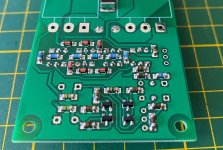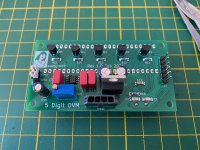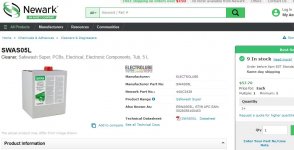Kester 24-7068-1402
I agree with everyone that leaded solder is much easier to use.
However I decided to switch to lead free years ago, tried a lot of different types and brands. Most of them seemed the same, need higher temps and don't flow as well if at all.
In the end I switched to lead free Kester 24-7068-1402, link here- https://www.amazon.com/KESTER-SOLDER-24-7068-1402-SOLDERWIRE-217%C3%82%C2%B0C/dp/B00DDDFYKW
It was advertised at the time as a low fume type product, and now I see that is not the case anymore for some reason? This advertising hyperbole has been dropped. Hmmm.... I pretty much picked it for this reason and it does not put a lot of junk into the air when you are using it as far as I can tell from the obvious stuff that I can see and smell.
In any event it does not smell that bad or make a lot of smoke. I have made literally thousands of connections with it and not had a problem thus far. It does behave like lead free with very little running and so on, so not as nice. But if you have to use lead free it seems to do the trick.
I agree with everyone that leaded solder is much easier to use.
However I decided to switch to lead free years ago, tried a lot of different types and brands. Most of them seemed the same, need higher temps and don't flow as well if at all.
In the end I switched to lead free Kester 24-7068-1402, link here- https://www.amazon.com/KESTER-SOLDER-24-7068-1402-SOLDERWIRE-217%C3%82%C2%B0C/dp/B00DDDFYKW
It was advertised at the time as a low fume type product, and now I see that is not the case anymore for some reason? This advertising hyperbole has been dropped. Hmmm.... I pretty much picked it for this reason and it does not put a lot of junk into the air when you are using it as far as I can tell from the obvious stuff that I can see and smell.
In any event it does not smell that bad or make a lot of smoke. I have made literally thousands of connections with it and not had a problem thus far. It does behave like lead free with very little running and so on, so not as nice. But if you have to use lead free it seems to do the trick.
Last edited:
Ebay can be a bit of a minefield for solder.
I bought the same cheap solder quite a few times from same seller with no problems. On the last I bought some it would barely melt. I tried to solder a SMT IC and it failed miserably. Had to bin the IC and pcb as it wouldn't unsolder.
Found some cheapish lead/tin solder by Nielson and that works great.
I bought the same cheap solder quite a few times from same seller with no problems. On the last I bought some it would barely melt. I tried to solder a SMT IC and it failed miserably. Had to bin the IC and pcb as it wouldn't unsolder.
Found some cheapish lead/tin solder by Nielson and that works great.
Ultrasound cleaning causes tiny bubbles which evaporate part of the liquid.
IPA is volatile and flammable.
You guys are lucky you did not have have any fires or explosions using that stuff in an ultrasonic bath.
For cleaning flux, I put a few drops of IPA on the board, after removing or loosening the flux, and use an old tooth brush.
It works, and my city has a hot and humid atmosphere, so windows are always open, and a fan is on. Think 40 degrees, 75% humidity....So exposure to fumes is not going to happen.
Bear in mind that you are dealing with volatile and toxic stuff, always work in a well ventilated area, and try to direct the fumes away, I use a table fan along with a ceiling fan.
IPA is volatile and flammable.
You guys are lucky you did not have have any fires or explosions using that stuff in an ultrasonic bath.
For cleaning flux, I put a few drops of IPA on the board, after removing or loosening the flux, and use an old tooth brush.
It works, and my city has a hot and humid atmosphere, so windows are always open, and a fan is on. Think 40 degrees, 75% humidity....So exposure to fumes is not going to happen.
Bear in mind that you are dealing with volatile and toxic stuff, always work in a well ventilated area, and try to direct the fumes away, I use a table fan along with a ceiling fan.
Note that non-consumer electronics have no issues whatsoever with leaded solder.
This is not true. Even in medical, pretty much everything that isn't life sustaining must be RoHS compliant now.
Completely different issues, petrol used an organic lead compound readily absorbed into the body. Paint used lead compounds, the habit of children to chew on things got it into the body.The reason for removing lead from solder is the same reason lead was removed from paint and automotive fuels, its a neurotoxin and it accumulates in the body.
Water in upland rivers in Cornwall can contain alarming levels of heavy metals, including lead and uranium
Being a painter, I was advised to always wear a safety-mask when reworking old surfaces, because oh-so many times we'd see old leaded pigments (the orange stuff against rust, the white stuff for its whiteness, but up to the eighties almost every color was leaded, and thus lead was a quite common cause of crippling intoxication among us. Luckily, this chalice passed by me.
Completely different issues, petrol used an organic lead compound readily absorbed into the body. Paint used lead compounds, the habit of children to chew on things got it into the body.
Water in upland rivers in Cornwall can contain alarming levels of heavy metals, including lead and uranium
Don't see how it can be different issues, lead is toxic whether its in automotive fuels, paint or solder.
Governments around the world have mandated the abolition of lead from petrol/gasoline, paint and solder/electronics due to the serious adverse effects to people's health.
I was working in an authorized repair centre for known brands of test equipment and was the method of cleaning.
So what? Either you guys had an explosion proof ultrasonic or you were probably violating safety guidelines.
Apropos cleaning a board: I use IPA, but it is a bit difficult, boards end up looking smeary even after 3 rounds… is ultrasound (?) a viable option?
I use safewash: SWA Safewash 2000 'Safe' solvent cleaner - Electrolube
I don't use it straight, as it's a waste of money to do so. Instead I plonk the boards in a big pyrex dish, pour boiling water over them, then add about 5-10% safewash.
Give it a bit of a scrub with a brush, then rinse under tap water, then deionised water, then dry with a hairdryer. The result is properly clean
And having been soldered with leaded solder and rosin flux, the joins are shiny and reliable.
Attachments
The amount of solder consumed by repair and hobby builders is a tiny fraction of the amount used in electronics production.
Not enough for an environmental disaster, if we hobby people used regular solder.
True. But the flip side of that coin is that the hobbyist market is tiny, so it would be understandable if manufacturers of solder were focusing on lead-free and making less leaded solder available.
Tom
And having been soldered with leaded solder and rosin flux, the joins are shiny and reliable.
Now that's pretty! I should see about getting some of that detergent. I bet my assembly house would let me siphon a bit from their supply if I brought a couple of boxes of doughnuts.
Tom
True. But the flip side of that coin is that the hobbyist market is tiny, so it would be understandable if manufacturers of solder were focusing on lead-free and making less leaded solder available.
Tom
Not while people are building avionics, and making other high reliability soldered assemblies. Leaded solder will always be available.
Rosin flux, OTOH, is getting really annoyingly hard to find, in my experience due to the no clean rubbish. Thankfully the ingredients are incredibly easy to find, so you can just make your own.
Suzy's Blog: Suzy's Super Rosin Paste Flux.
Is a 5L container the smallest size?
https://www.newark.com/electrolube/swas05l/flux-remover-can-5l/dp/44AC2438
https://www.newark.com/electrolube/swas05l/flux-remover-can-5l/dp/44AC2438
Attachments
You can get it in a spraycan form too. The 5l size is what I have, and it lasts for years.
Thanks for the recommendation!
Freon (or chlorinated solvents in general) are death for electrolytic capacitors. The solvents sneak in past the rubber seal and cause the capacitor foil to slowly and unpredictably turn to mush. Quite a few years back we had a failure issue with one of our big customers where the HV bulk energy storage caps on some SMPS actually caught on fire. Our HK factory was using Freon or TCE to wash the boards.... Acetone is bad news for sensitive components like polystyrene capacitors.
If you want to get a clean-looking board, use a stiff brush with IPA to get the flux off, then rinse in some clean IPA ( a pie tin works well for this purpose) and pat dry.
If you want to get a clean-looking board, use a stiff brush with IPA to get the flux off, then rinse in some clean IPA ( a pie tin works well for this purpose) and pat dry.
- Home
- Design & Build
- Equipment & Tools
- Good lead free solder availible yet?


